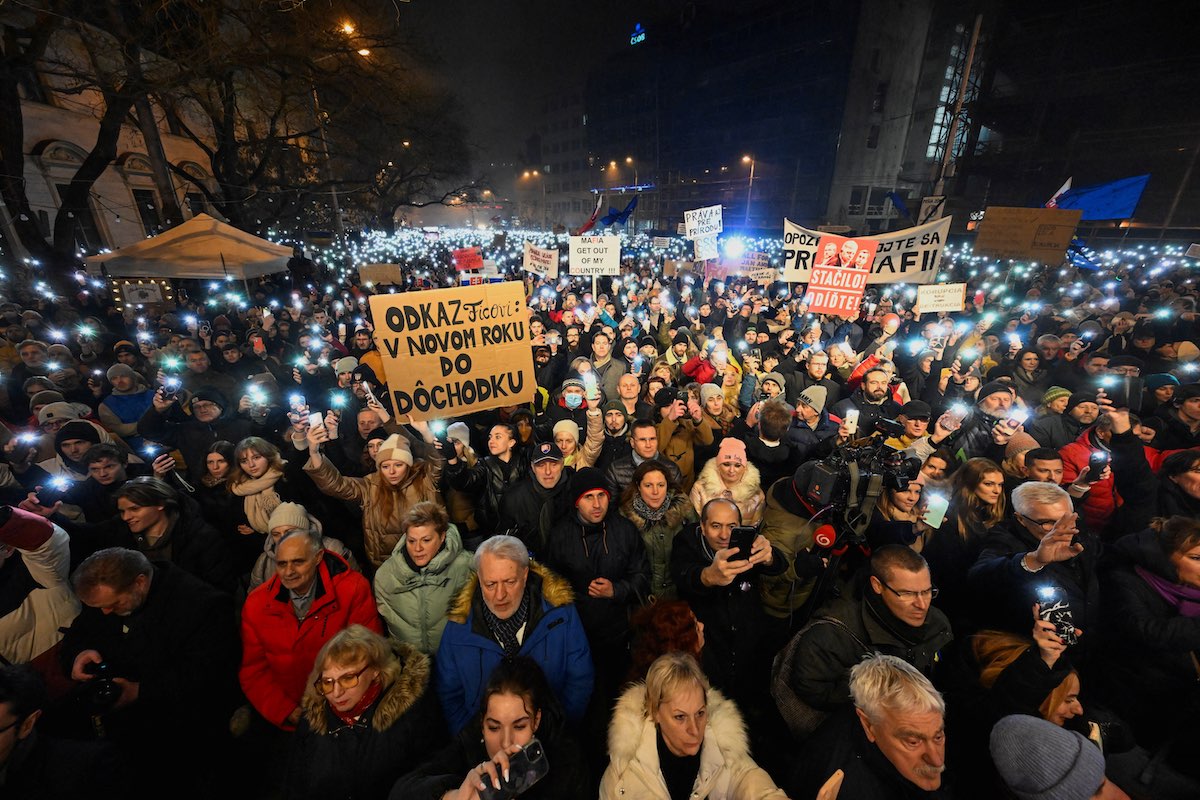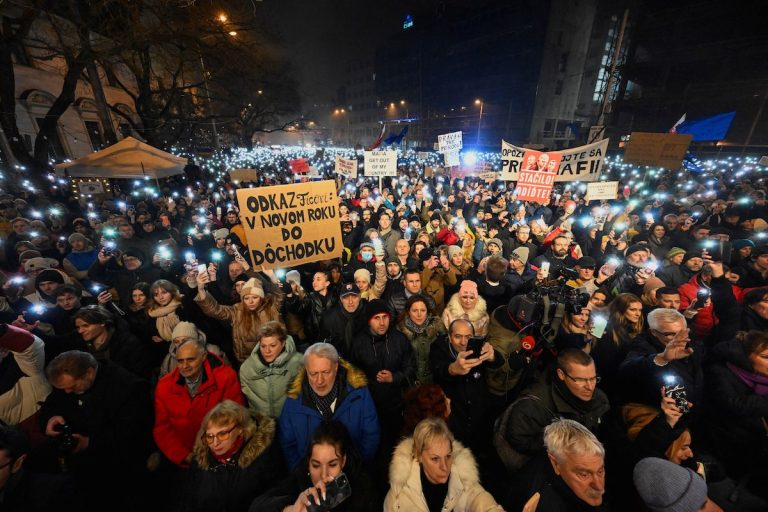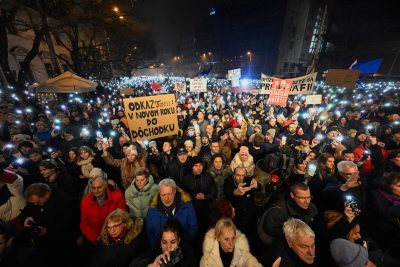The Office of the Special Prosecutor has overseen the most serious cases of organized crime and corruption in Slovakia for almost 20 years, a period that includes previous SMER governments. Robert Fico has long attacked the office, but now, his government has prepared a proposal to abolish it altogether. If this proposal were to be adopted, all cases would be redistributed among regional prosecutors.
Among them is the case of the murder of investigative journalist Ján Kuciak and his fiancé Martina Kušnírová. The executors and the mediator were already found guilty. Business tycoon Marian Kočner’s associate, Alena Zsuzsová, has also been convicted in the first instance court (the trial court of original jurisdiction). Marian Kočner, accused of ordering the murder, was acquitted by the same court. However, following appeals, the trial is now heading to the Supreme Court. If the special prosecutor’s office is abolished, a new prosecutor would take on the case. Will he be able to study the case properly? Could the new prosecutor stop the case from going forward?
Matúš Harkabus, the supervising prosecutor in the investigative journalist’s murder case and a separate but related case in which prosecutors’ murders were prepared, and in which Marian Kočner is charged – the two cases are being tried together –, answers VSquare partner ICJK.sk’s questions in an exclusive interview.
Let’s start with the most important question. Could the abolition of the Special Prosecutor’s Office, which was approved by the government recently, jeopardize the trial in the murder case of Ján Kuciak and Martina Kušnírová, which you are supervising?
I would say that the draft law that was approved by the government basically regulates the mechanism for the abolition and dissolution of the Office of the Special Prosecutor. And that specific criminal cases, which are still pending, are to be handed over to the regional prosecutor’s offices in the place where the offense was committed according to the Code of Criminal Procedure. The prosecutors are to be transferred to the General Prosecutor’s Office—well, actually, to remain in the General Prosecutor’s Office, because even now we are prosecutors of the General Prosecutor’s Office, but we are assigned to the Office of the Special Prosecutor.
In the particular case of the murder of Ján Kuciak, the situation is such that it is under appeal. As far as I know, the case has not yet been submitted to the court of appeal—the Supreme Court of the Slovak Republic—but it is foreseeable that this will happen in the short term, so it will be at the appeal stage. The competent authority to supervise the case [if the amendment is approved] would be the Trnava Regional Prosecutor’s Office, so the case would go to a prosecutor in Trnava. Of course, there is still the possibility for the prosecutor general to, if I am not mistaken, also assign it to another regional prosecutor’s office, or he could assign it to a prosecutor of the General Prosecutor’s Office for direct supervision.
So the case will be given to a new prosecutor, who will have to familiarize himself with the case file, the appeals of the individual parties—that is, of the convicted Zsuzsova—and our appeals as prosecutors against most of the verdicts, especially the acquittal of Marian Kočner.
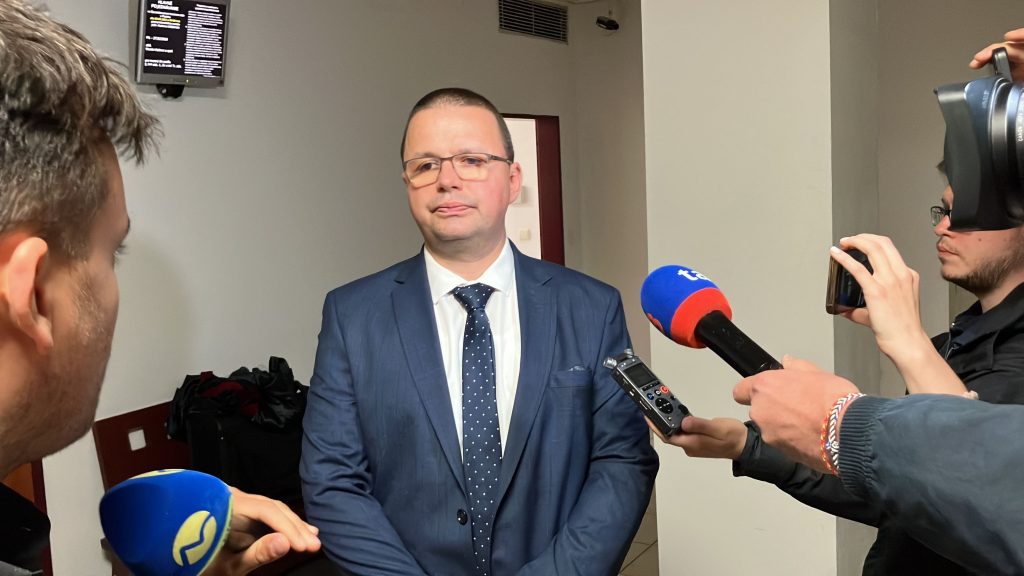
Matúš Harkabus. Photo by: Tomáš Madleňák
Since the prosecutor general has the opportunity to assign the case to any prosecutor of his office, and you, as a prosecutor of the Office of the Special Prosecutor, would be working in the Prosecutor General’s Office, is there a possibility that this case would somehow remain with you? Or is there zero such possibility?
I don’t want to speculate on that. Of course, each of us, whose work situation changes, also thinks about how to arrange our private, personal affairs. I don’t know where we would be assigned, to what department in the Prosecutor General’s Office, what would happen to us, whether there is still a possibility of an agreement with the prosecutor general. So I don’t want to speculate on whether I would stay in the Prosecutor General’s Office. At this point in time, as I’m evaluating this, preliminarily, I’m quite realistically admitting the possibility that I won’t stay.
So let’s assume that some new prosecutor will get it, either automatically or because the prosecutor general has assigned it to someone. Could, theoretically, this new prosecutor simply withdraw the indictment, either before or after the Supreme Court’s decision?
No. The indictment can only be withdrawn before the main hearing is open. In this case it was opened a long time ago, sometime in 2019. So, simply, that option is no longer there.
I’m asking directly because there has been such a buzz in the public: That the case will be assigned to someone who will decide to just completely sweep the whole thing under the rug. Is this not possible?
Well, there are two possibilities. But we are talking about sabotaging the prosecution here, because in a case where most of the defendants have already been found guilty, I absolutely cannot see how the prosecutor, even if it were possible, would just go ahead and withdraw the prosecution. But yes, there is one possibility, which is called “the prosecutor backing down from the indictment.” That one is used specifically when the prosecution lacks evidence. It happened to me once in my life when I backed down from an indictment, back in the district attorney’s office. At that time, there was a mandatory consequence that the court acquitted the defendant. So yeah, but I don’t want to speculate. And I don’t think any of my colleagues would do that. I don’t want to sound, even if the special prosecutor’s office is abolished, like the colleagues in the regional prosecutors’ offices are somehow incompetent. I myself came out of the regional prosecutor’s office in Žilina, where I worked for eight years. There are very erudite, clever lawyers and honest people there. So I think that the same can be said of most of my colleagues in other regional prosecutor’s offices.
The only problem, then, is whether logistically and capacity-wise the huge volume of cases can be handled at all once they have been transferred to the regional prosecutors’ offices. Whether it will be humanly possible to carry out this supervision in such a way that it will be effective. The case of Ján Kuciak is specific for the amount of preparation prosecutors have done for the appeal stage. It is clear that this prosecutor will have to study a lot. I know for myself, when my colleague Daniel Mikuláš and I took over, how much it took to really get into the case.
[Note from editors: The case was supervised by another duo of the prosecutors, went through the first trial, where Kočner was acquitted, and appealed to the Supreme Court, which canceled the first court’s decision and ordered a retrial. Then, in 2021 it was joined with another related case—the case of preparation for the murders of prosecutors, in which Kočner and Zsuzsová were also charged, even though the murder plot did not materialize—and assigned to new prosecutors: Matúš Harkabus and Daniel Mikuláš.]
So how long did it take you when you took it? Are we talking weeks, months?
Certainly months. My colleague Daniel Mikuláš had been assigned to preparations for the murders of the prosecutors, which he received just before the end of the preparatory proceedings. He had to get into it very quickly because it was still, I think, a custodial case at that time. But apart from that, of course, you don’t have only one case assigned to any prosecutor in Slovakia. I’ll say for myself that I have something like thirty of them now. And in the regional prosecutor’s offices it varies, but let’s say also several dozen cases per prosecutor. And now there will be about a thousand new cases that are pending in the courts that will be reassigned to the county prosecutors’ offices. I have not quantified it exactly, but it is actually certainly more than a thousand, maybe a thousand five hundred, maybe two thousand. And it varies, but it’s mostly large cases. So whoever gets it is going to have to do a detailed analysis, study the case file. That is very, very time-consuming.
I am afraid of this. I’m not worried about a person getting it who wants to torpedo prosecution or something like that. I don’t think so. But I think we may well be in a situation where time is going to be limited. Of course, if the Supreme Court takes it up in the next few days, they’re not going to set a hearing in a month either. Certainly not in such a comprehensive case. So there will certainly be room for the particular prosecutor who gets it to study it.
So if this gets to the Supreme Court in the next few days, how long will it take? What’s your guess? Because the transfer of all those cases is going to happen very quickly, but it’s going to take some time for the Supreme Court to make a decision. In the meantime, does the new prosecutor absolutely have to do anything? Doesn’t it make things a little bit easier for him that you have already filed the appeal, argued the case, and therefore everything is kind of already in motion until the Supreme Court decides?
We filed the appeal right at the hearing after the judgment was announced. We then justified that with a 115-page statement of reasons. In it, we explained why, in our opinion, the judgment, particularly the part concerning Marian Kočner, suffers from quite serious shortcomings, which we are trying to remedy. We have also come up with some new evidence and I have ordered the investigator to provide some evidence which, in view of the reasoning of the court’s decision, which rests in particular on the dissection of the alleged collusion between Marian Kočner and Alena Zsuzsová, would still be appropriate to carry out. These are now being returned to me; I have most of them. I would like to submit them before the end of the Special Prosecutor’s Office, and therefore the prosecutor who receives them will have some guidelines from us. Of course, he can work within the confines of that appeal. He can say, I insist on this, I still propose this, and so on. But there is not some norm that obliges him to actively intervene in the matter while the Supreme Court is deciding.
So, when do you think we can expect a ruling from the Supreme Court and what are the possibilities of how it might actually rule? What do you expect?
We, of course, suggest that it should uphold the judgment in part and in part it should overturn it. It’s quite complicated because there are different rulings from the court for different defendants. We have four defendants there. So for Alena Zsuzsová, although we are not questioning the guilty verdict, we are questioning both the legal qualification and the wording of the offense, and we are proposing that her sentence be changed and that she be sentenced to life imprisonment. In the case of Marian Kočner, the Supreme Court cannot change the sentence because he was acquitted by the first instance court. If the Supreme Court upholds our appeal, it will have to return the case to the Specialized Criminal Court. As for Dušan Kracina, we do not question his guilt, we only propose a harsher sentence. As for Darko Dragić, he was acquitted, so we are also proposing to return the case there for further consideration.
By the way, so as not to create any public expectations, that the case is to be submitted to the Supreme Court these days is more or less my guess. But when I checked the status of the case about a month ago, the judgment was still being translated because it needed to be presented to Darko Dragic [in Serbian], so that delayed the case.
But if we are to assume that the judgment will be submitted to the Supreme Court sometime early next year—well, based on how quickly the court ruled in the first round, it ruled after about nine months. But without the prosecutors’ murder preparation case. But I’m assuming that the timeline could be similar. It’s not a question for me, I don’t want to speculate, but I certainly don’t expect it before the autumn of next year.
And assuming that the Supreme Court decides that the case of Marian Kočner has to go back to the Specialized Criminal Court—are we talking about a complete retrial of the whole thing and another year of hearings?
We don’t have to talk about a retrial of the whole trial. That is, if you mean conducting the trial from the beginning. That’s what we were considering, whether to propose a withdrawal of the case from the senate at the Specialized Criminal Court, or to ask for a change in the composition of the senate [that is, to ask that it be made up of different people], a change the defense would not agree to. It will be up to the Supreme Court to decide whether or not to proceed with such a measure. I maintain that I still trust this senate of the Specialized Criminal Court to be able to consider the matter. It has dealt with it rather quickly, in the context of the Slovak criminal procedure and given the enormity of the case. So we did not suggest that a different or a changed senate should hear the case. We will see how the Supreme Court will deal with this. It does not need our proposal to make such a decision, it can do it on its own initiative. We shall see. I would argue that if the case were at first instance for the third time, it would be quite problematic to start it again from the beginning. It would be the third time using the same evidence. So we would like to avoid that.
There is talk not only of abolishing the Special Prosecutor’s Office, but also the Specialized Criminal Court. Assuming that something like this were to happen, would it then go back to some ordinary district court, which would have to adjudicate on it? And does that not run some risk of jeopardizing the whole process?
Well, that would depend on how the transfer of the cases from the dissolved court is set up legislatively. In the past, a number of courts have been abolished. So there it would come down to whether the sitting judges would change, how that would be set up, what would happen to those judges, where would they serve, and so on. That is not a question for me at all. That is a question for the current political power, which is currently pushing for the abolition of the Office of the Special Prosecutor. I think it is clear to everyone that this is not about better incorporating it into the General Prosecutor’s Office or anything like that, but the abolition of the office, because the point of the office is in the workload and files, which are being transferred to other offices.
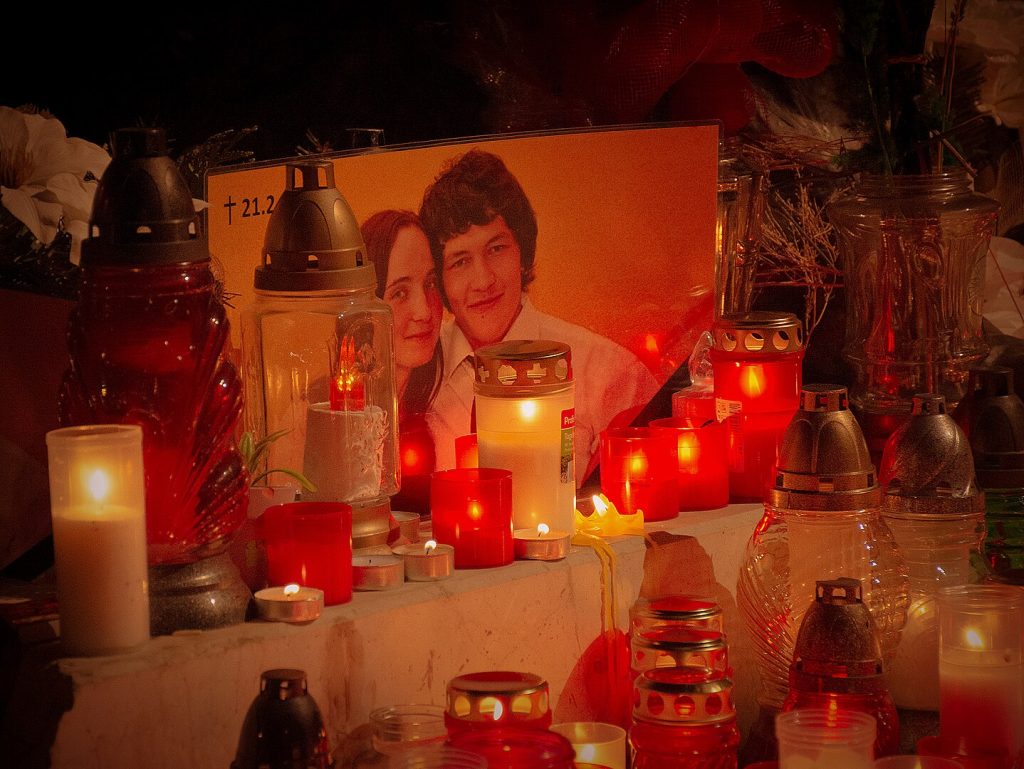
Commemoration of Ján Kuciak and Martina Kušnirova. Source: Wikimedia Commons
The public may feel that the trial in the case of the murder of Ján Kuciak is taking quite a long time. I understand why it is taking so long. But the public feeling may be that it has been more than five years since the murder, and we are now talking about the fact that it may take even longer. When I was looking at the government’s amendment to the criminal code, it struck me that one of the new mitigating circumstances under which a decision can be thrown out or changed is if the prosecution has been carried on for an unreasonable length of time, unless the length of the process can be attributed to the obstructions from the perpetrator or his defense counsel. Does this mean that we can now expect that, even if Marian Kočner is found guilty by a court, he will be given the mitigating circumstance, and therefore a lesser sentence, because of this simply having taken as long as the trial did?
I do not think that, given the circumstances of the case and the way our criminal procedure is set up, i.e. what we notoriously repeat trials, that it is all overly formalized…, that this trial or these proceedings as a whole are taking a long time.
In my opinion, in the phase of the preparatory proceedings, we cannot criticize them in terms of speed. There were indeed massive resources deployed on the part of the police, and those people really went above and beyond human capacity to bring the case to light. There can be no dispute about that. And the court—well, this is actually an advantage of the Specialized Criminal Court over the ordinary courts, that it has the time and the space allocated for such an agenda. Note that during that second round, that is, from about February 2022 to May 2023, that is over the course of a year and a quarter, there were 39 hearings. That is not a few. Whatever my criticism of the judgment, the one thing I cannot blame the court for is that it acted quickly.
I understand that the public wants quick results and needs to see justice quickly. However, it is important to realize that even in countries which do not have such a formalized criminal procedure, trials of this kind take a long time. In Italy, mafia murders are routinely convicted after ten years. Again, let us not kid ourselves.
And as for that mitigating circumstance? I do not think that this particular part of the draft amendment to the criminal code should be in any way problematic, and the reason for this is that we have already, according to the case-law of the European Court of Human Rights, taken into account the prolonged conduct not caused by the accused, who is found guilty at the end, in the framework of the so-called extraordinary reduction of the sentence. Now it is actually formalizing it, it is an additional mitigating circumstance. But I wouldn’t see that as another defect in the proposal. It is basically putting on paper what has been true before, so I have no objection here.
There is one other thing that has been circulating on the Slovak internet, and that is the fear that Marian Kočner, who is currently convicted in another unrelated case of economic crime, might be released sooner because the amendments proposed by the current Fico government are lowering the sentences for various economic and corruption offenses. Do you think this is realistic? Would this not be retroactive?
I do not want to assume the role of an expert in constitutional law, but I think that here it would be retroactive in favor of the convicted person. It also depends on the legislative setting, that is, whether sentences that have been legally imposed but not yet served will also be reviewed. As far as I can see from the draft, there is no such provision.
I would, however, draw attention to another paradox. I do not mind, in principle, that a practice that we have done before is put down on paper. What bothers me is that nothing is being done about the long-standing problem with the criminal procedure code: that it is such a motivator for obstruction. And therefore also a burden on the acting authorities and on the courts, forcing them to repeat witness statements. That victimizes the victims of crime. There is secondary victimization in repeated interrogations. And that is a big cause of delays. And nobody does anything about that.
At a press conference, Robert Fico said that the Office of the Special Prosecutor’s Office is, in his opinion, unreformable. He literally said that Daniel Lipšic came in like a fish and spawned himself there and because of that it is irredeemable. He also named you personally, he said your name. How do you perceive this whole situation?
It’s such a “laughter through tears” situation that it was quite a funny bon mot, with the fish spawning, in the context of the situation. But the truth is, and I speak for myself, but your colleagues would surely confirm it, that I have never worked with such a degree of autonomy and independence in a hierarchically managed prosecutor’s office as I have under the superior prosecutor, Lipšic. That is the point. You know, the prosecution system is so marked by the hierarchical nature of the superior prosecutors. There are always reports: reports you have to file to your direct supervisor. But a lot of it is just a burden. You’re burdened by constantly reporting what you’re doing to your superiors. Under Lipšic, this is minimized, and of course people like it. People who want to work and who do not want to be mere executors in the system and who, dare I say it, are not entirely comfortable in the standard system. That alone, to use the vernacular, unties the hands of the prosecutors.
So perhaps Mr. Fico sensed this, or heard it somewhere, and commented on it in this, I would say, derogatory way. Particularly towards Lipšic, and also towards us, but you know…
Look. It is true that in recent years, criminal law reached floors of influence and power it had never reached before. I don’t think it’s thanks to Lipsic. Lipšic’s contribution is elsewhere—in what I told you. After all, those prosecutions started before Lipšic came to the Special Prosecutor’s Office. So I think it is over the line to attack an institution and the people employed there in this way. After all, we have seen trials that have touched even higher floors of politics elsewhere. We have seen the trial of Mr. Babiš in the Czech Republic, where he was even acquitted at first instance. But do you remember him making press conferences comparing prosecutors to beasts or the Gestapo? To this, we are forced to speak out publicly. Because this is so intrusive into the very confidence of the people in the institutions as such that we must, in my view, although in a restrained way, must comment on it.
And, despite the fact that you will no longer be able to oversee this, that the murder of Ján Kuciak and Martina Kušnírová will eventually be justly condemned?
Of course I believe so. I believe that the courts operate a system that guarantees us justice. The system of scrutiny in the courts is not entrusted to one man, but is entrusted to the senates. And I believe that these are difficult things to assess. They are difficult to interpret, difficult to understand logically. But I believe that the system is workable and that it will guarantee a fair decision. It is true that sometimes circumstances are such that those judges disagree—that the judges with the prosecutors, with the defense. Also, that it gets drawn out, that’s true. And I am particularly sorry for the surviving parents of Ján Kuciak and Mrs. Kušnírová, because the persistence with which they attend hearings, where terrible things are said, and how they fight for those dead children, is something truly moving and amazing. And I am very sorry that they do not yet have a final verdict.
Cover photo: Demonstrators take part in a protest against the government’s plan to scrap a special prosecutor’s office, in Bratislava, Slovakia, December 19, 2023. Photo: Radovan Stoklasa / Reuters / Forum
The Slovak version of this interview was published on icjk.sk
Tomáš Madleňák is a Slovak journalist who has worked for the Investigative Center of Ján Kuciak since 2020. He is based in Bratislava.

